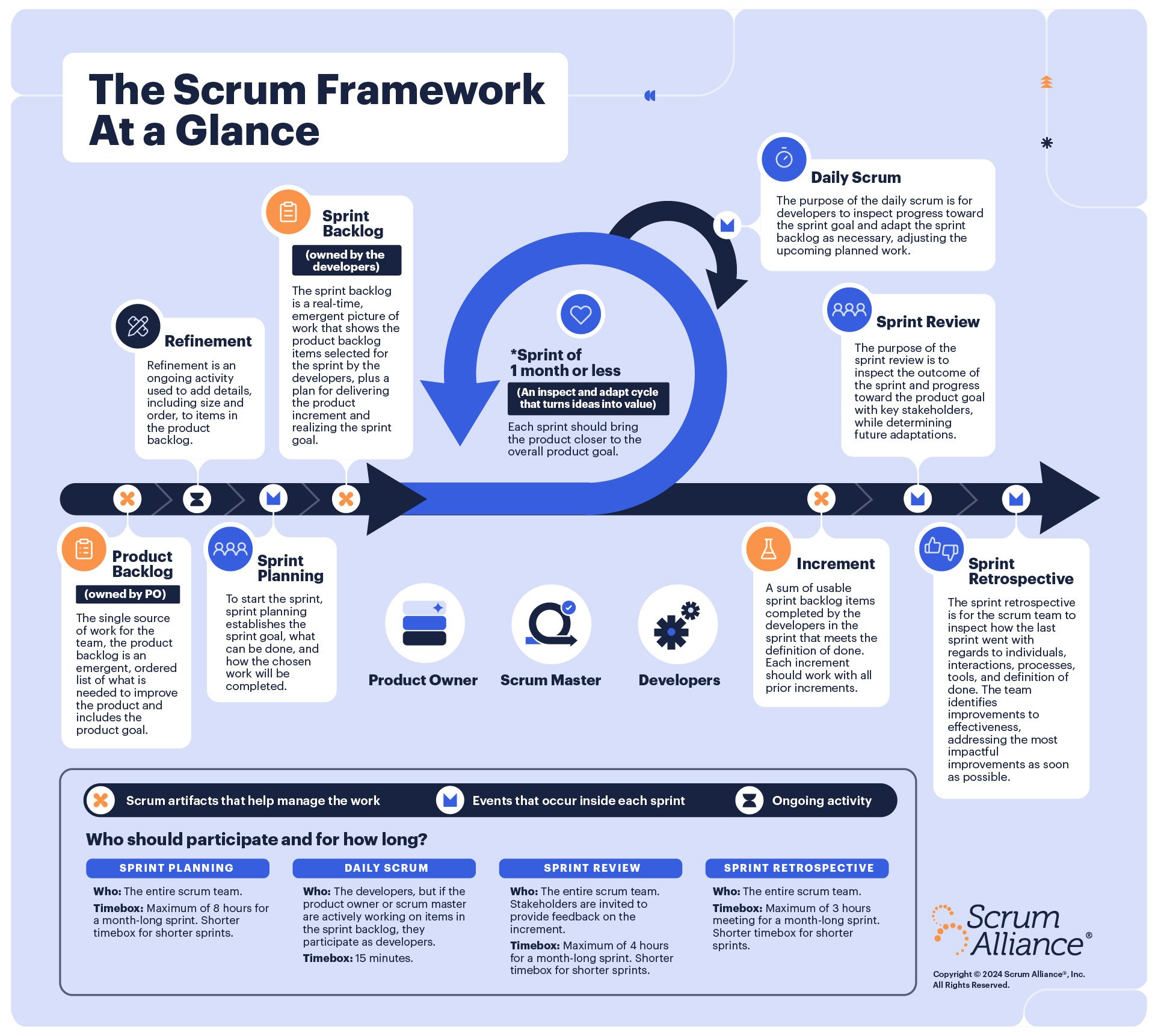Learn about purchasing for teams
What is a scrum master?
Guide teams and organizations to success with scrum. You can unlock new possibilities in any career with scrum master skills.

What is a scrum master?
One of three essential scrum team accountabilities.

A master of scrum who supports continuous team improvement
A scrum master is a coach and a guide who ensures their team understands the scrum framework and its values and practices. They are a servant leader who helps their team in many ways.
Scrum master duties may include:
- Facilitating conversations between members of the same team or across teams to resolve conflict and improve collaboration
- Managing impediments so the team can focus on getting work done
- Coaching the team toward better self-management
All of these elements can ultimately help the team use the iterative process of scrum to make products, services, and features their customers love.
Exceptional scrum masters have the right combination of experience and training. The Certified ScrumMaster® (CSM®) course from Scrum Alliance is a great starting point if you want to build your knowledge while immediately adding in-demand skills to your resume.
The basics of scrum in under 10 minutes

Responsibilities
You can foster courageous, high-performing teams with scrum.

Scrum master: The person on the scrum team accountable for implementing the scrum framework, coaching others to understand it better, and enabling the team to continuously improve.
If you become a scrum master, your daily responsibilities will depend on the context. Some organizations and businesses use “by the book” scrum mechanics while others may use a different approach; overall, as a scrum master, your responsibility is helping your team understand and use scrum effectively.
Despite some variability in the day-to-day, most scrum masters have these essential responsibilities in common:
- Establish the scrum process and practices
- Educate about the scrum values
- Help the team resolve conflicts when possible
- Protect the scrum team from unnecessary distractions or interference
- Facilitate team meetings like the daily scrum, sprint planning, and sprint retrospectives
Scrum teams are flat; there’s no hierarchy in the team roles. But a scrum master educates team members in the tools and techniques for self-management and then steps back so the team can self-organize. For example, a mature scrum team can often lead a valuable daily scrum without their scrum master. The scrum master isn’t a team manager, but instead a process coach and a servant leader (also called a “true leader” in the Scrum Guide).


Scrum master jobs
Deliver more impact in any role with scrum master skills.

Many industries are looking for scrum masters and other agilists today. Perhaps you’re wondering if you’ve got what it takes to pursue a scrum master job. Good scrum masters tend to relate to these qualities:
- I naturally focus on the team
- I enjoy helping people develop and grow
- I’m people-oriented
- I enjoy helping others adapt to change
- I’m good at facilitating discussions
- I enjoy empowering teams
- I like ensuring people understand the priorities
Whether you have experience or have never worked as a scrum master, many types of industries are looking for scrum process coaches for teams in:
- Software development
- Technology
- Product development
- Marketing and advertising
- Financial services
- Front-office administration
- Design
- Construction
- Government
And the sky’s the limit! Scrum and agile mindsets are becoming more common in work environments across the globe. While these practices originated in software development, they are expanding to all sorts of teams that deliver products and outcomes their customers love.
Stand out in the job market: The scrum master certification track
While requirements will vary by job opening, completing a Certified ScrumMaster course or Advanced Certified ScrumMaster® (A-CSM®) course from Scrum Alliance will demonstrate your proficiency and commitment to scrum. These courses are taught by experienced Certified Scrum Trainers and provide a deep dive into the role. Plus, you’ll have the opportunity to obtain a certification to prove your expertise! Once you've completed the A-CSM, you can achieve elite scrum master status and unlock doors to careers with more responsibilities and impact when you take the Certified Scrum Professional® - ScrumMaster (CSP®-SM)

Scrum masters vs. project managers
Revolutionize your approach to work.

The scrum master is what is called a specific accountability on the scrum team, along with the accountabilities of product owners and developers. A scrum master is focused on agile principles and coaching their team.
Project managers tend to be focused on directing projects, which are often waterfall projects. Project managers usually make sure that everyone knows what they are doing, stays on schedule, sticks to the budget, documents progress, and generally manages the project.
There tends to be a different approach to the work and much different responsibilities between the two, although of course there may be overlap.
If you are a project manager, you can put the skills you learn in Certified ScrumMaster training to work in your role. You'll learn about increasing the adaptability of your team, responding to feedback, and aligning backlogs and priorities with organizational and business goals. Consider taking the course to increase your agility even if you don't plan to leave your project management role!

Build in-demand skills
Increase adaptability, responsiveness, and customer satisfaction.

Being a master of scrum usually looks a little different from business to business and team to team. That’s because there are so many unique, real-world variables that may affect your practice of “by the book” scrum. At Scrum Alliance, we are advancing real-world agility by making sure you have the resources and know-how to navigate these situations.
Increasingly, scrum masters are expected to possess lots of skills, from coaching to strategic goal setting. Whether you decide to work as a full-time scrum master or want to leverage scrum master skills in a different role, the Certified ScrumMaster track at Scrum Alliance is a learning path to build your scrum know-how.



